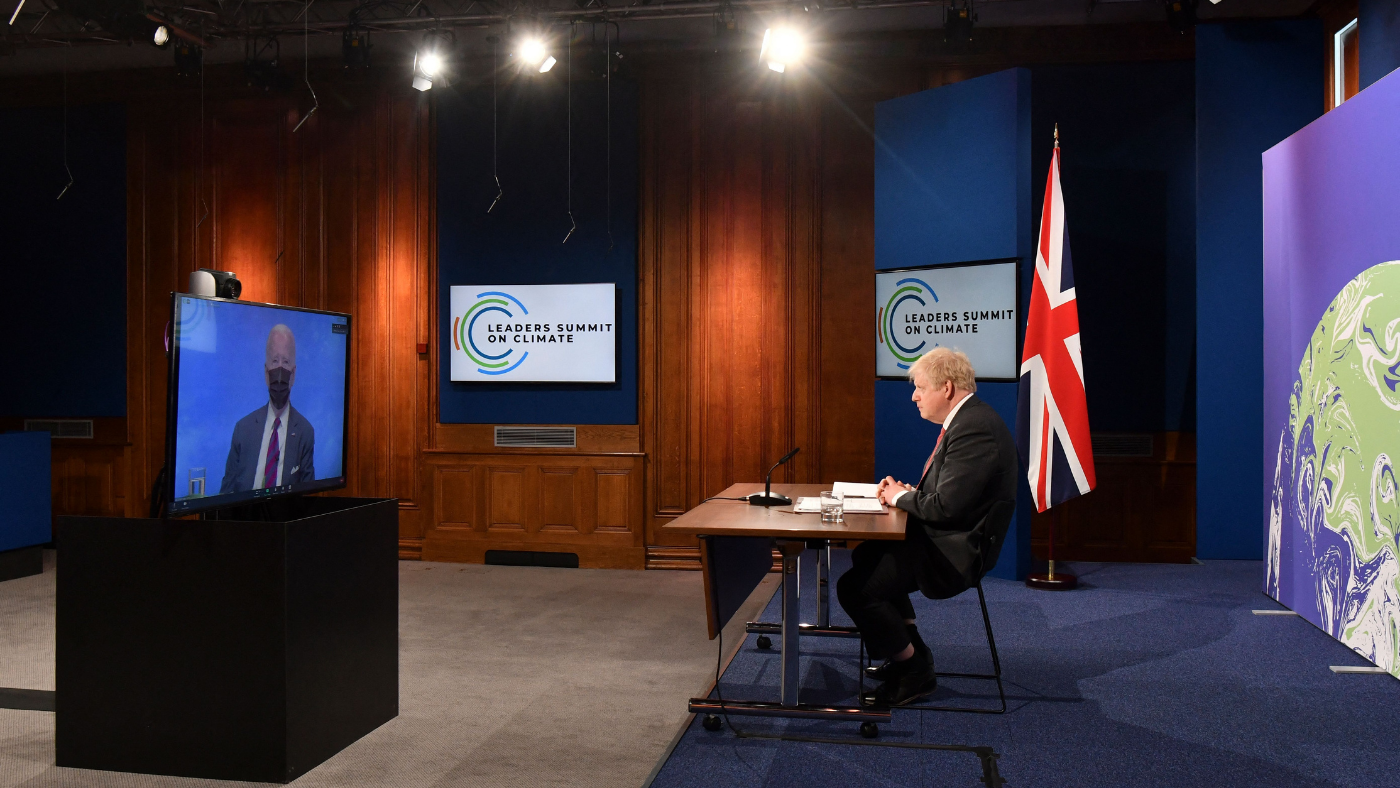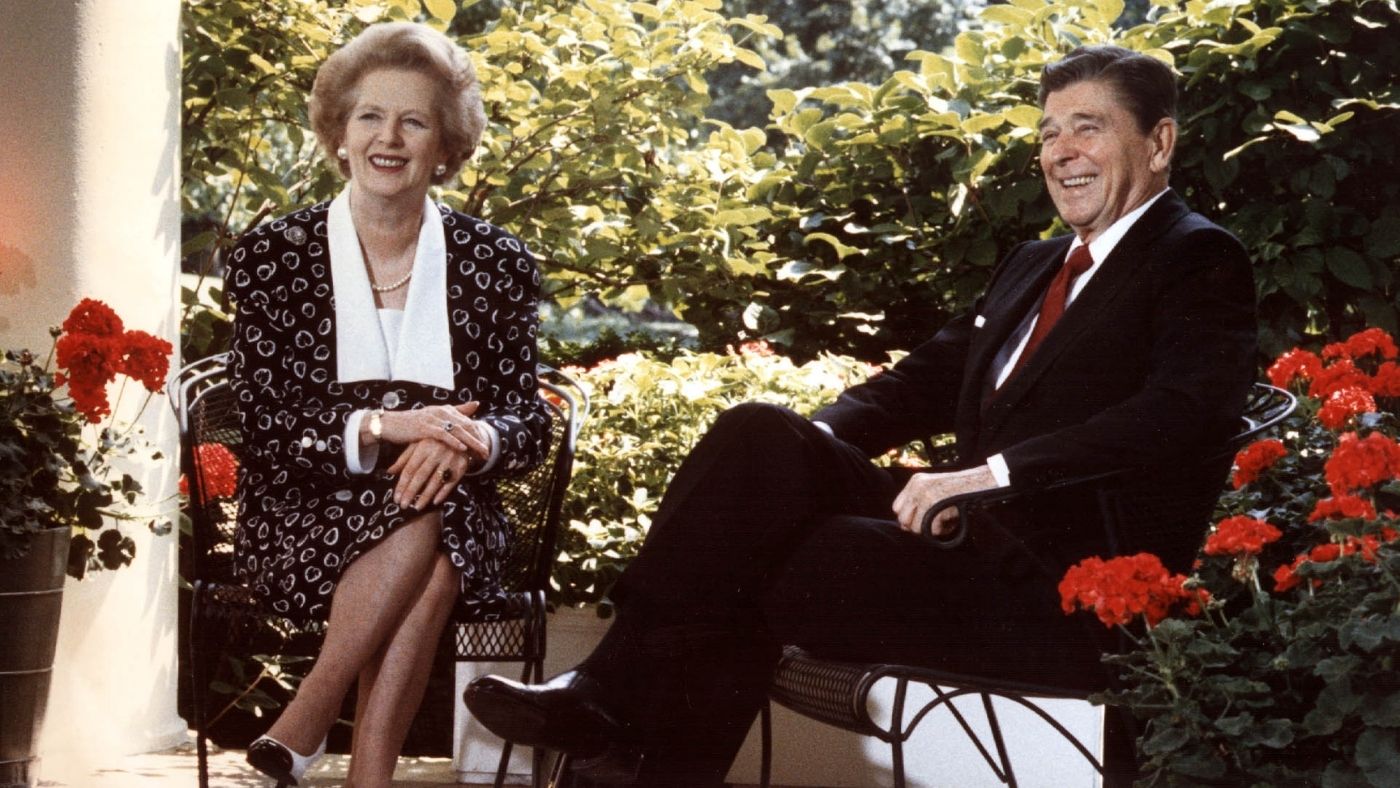Is the US-UK relationship really so ‘special’?
Joe Biden isn’t playing ball with Boris Johnson over post-Brexit trade plans

A free daily email with the biggest news stories of the day – and the best features from TheWeek.com
You are now subscribed
Your newsletter sign-up was successful
As Joe Biden and Boris Johnson prepare to meet in person for the first time ahead of this week’s G7 summit in Cornwall, the question preoccupying many political pundits is whether the duo will become friends.
The White House says the meeting on Thursday will “affirm the enduring strength of the special relationship” between the two countries, which may have been feeling less special to Johnson since Biden spoke out against Brexit before his presidential election victory last year.
Indeed, Johnson’s spokesperson emphasised yesterday that the prime minister “prefers not to use” the S-word, The Guardian reports. “But that in no way detracts from the importance with which we regard our relationship with the US, our closest ally,” the spokesperson added.
The Week
Escape your echo chamber. Get the facts behind the news, plus analysis from multiple perspectives.

Sign up for The Week's Free Newsletters
From our morning news briefing to a weekly Good News Newsletter, get the best of The Week delivered directly to your inbox.
From our morning news briefing to a weekly Good News Newsletter, get the best of The Week delivered directly to your inbox.
Post-pandemic recovery plans will be top of the agenda at the meeting of the two leaders, who will also be trying to agree decisions over the US and UK travel corridor, trade agreements and climate targets.
Whether they succeed in those goals should provide an insight into just how special the US-UK relationship really is today, following many decades of close ties between the two nations.
Postwar alliance
The close political ties between the two countries were forged by Franklin D. Roosevelt and Winston Churchill during the Second World War. In 1941, the pair wrote the Atlantic Charter, a joint statement outlining eight principles for a postwar world. The declaration provided the foundations for the Charter of the United Nations, which came into effect in 1945.
A free daily email with the biggest news stories of the day – and the best features from TheWeek.com
As international powers consolidated postwar alliances, Churchill’s 1946 Sinews of Peace Address gave a name to the Anglo-American alliance developed over the previous six years: the “special relationship”. The foundation of the US and UK’s “fraternal association” was not only a “growing friendship and mutual understanding” of one another but also, crucially, “the continuance of the intimate relationship between our military advisers”, said Churchill, then leader of the opposition.
Since the 1940s, the US and UK have continued to work closely together on military operations, as well as intelligence sharing and nuclear arms technology. On the global stage, the relationship has shaped geopolitical events too.
Margaret Thatcher “was an important bridge” between the US and the USSR in the 1980s, playing a key role in helping to end the Cold War, says the Financial Times’ Europe editor Tony Barber. The UK also supported the US invasion of Iraq in 2003, with damaging repercussions for Tony Blair’s political career.
How special is it really?
The “special relationship” has been characterised by highs and lows, and the ideological alignment and personal connection between Thatcher and Reagan is a unique case that was “never quite replicated again”, says The Guardian’s US editor Simon Tisdall.
Reports that Barack Obama had a bust of Winston Churchill removed from the Oval Office during his presidency fuelled speculation that the “special” nature of the relationship was losing its shine. In 2016, the former president clarified that, as the first African-American president, he “thought it was appropriate” to replace the bust with one of Martin Luther King Jr.

Yet while leaders on both sides of the Atlantic have continued to emphasise the ties between their nations, “in the modern era, the relationship has been shaped by two mutually reinforcing trends: the steady expansion of US global power, and the decline and fall of the British Empire”, writes Tisdall.
He argues that the story of the post-1945 special relationship “is really the story of how successive British politicians and diplomats have tried, with mixed success, to guide, cajole and manipulate US leaders from a position of ever-increasing weakness”.
Johnson is clearly aware of this disbalance of power. His spokesperson yesterday confirmed the PM’s dislike of the S-word after an insider told The Atlantic’s Tom McTague that Johnson deemed the description “needy and weak”.
Voters in both the UK and the US also appear to believe that political alliances are declining in importance when it comes to this transatlantic relationship. A 2018 British Council survey of more than 1,000 18-34 year-olds in the two countries found that respondents ranked culture and history above politics when it came to what factors most influenced public perception of Britain.
“The research suggests the relationship between the two countries is at root a cultural as much as a political phenomenon,” the survey report concluded. “Viewed in those terms it is indeed special.”
Match made in post-pandemic politics
Shortly after Biden’s inauguration, a close friend told The Telegraph that the president would “want to overcome any political differences” between himself and Johnson, as together they would carry “the destiny of the world on their shoulders”.
Relations between the two leaders had previously been rocky, with Biden repeatedly speaking out against Brexit. And if Johnson was hoping for the “quick win” of a US-UK trade deal after exiting the EU, Biden appears in no hurry to help.
The president’s power to fast-track trade agreements through Congress expires in July, and with government officials “downplaying the chances of imminent progress” in the UK, “the slowdown will be disappointing to Johnson”, says Bloomberg.
Johnson may have more luck in strengthening ties with Biden by moving the focus from UK trade to geopolitical matters. The issues that should be top of the US-UK’s shared agenda are “global regulatory reform, carbon pricing, and defending the rules-based system against China”, Tom Tugendhat, chair of the Commons Foreign Affairs Committee, told Politico.
But whatever the issues on the table at their upcoming talks, whether Johnson can forge close ties with his US counterpart remains a topic of much debate.
Julia O'Driscoll is the engagement editor. She covers UK and world news, as well as writing lifestyle and travel features. She regularly appears on “The Week Unwrapped” podcast, and hosted The Week's short-form documentary podcast, “The Overview”. Julia was previously the content and social media editor at sustainability consultancy Eco-Age, where she interviewed prominent voices in sustainable fashion and climate movements. She has a master's in liberal arts from Bristol University, and spent a year studying at Charles University in Prague.
-
 The problem with diagnosing profound autism
The problem with diagnosing profound autismThe Explainer Experts are reconsidering the idea of autism as a spectrum, which could impact diagnoses and policy making for the condition
-
 What are the best investments for beginners?
What are the best investments for beginners?The Explainer Stocks and ETFs and bonds, oh my
-
 What to know before filing your own taxes for the first time
What to know before filing your own taxes for the first timethe explainer Tackle this financial milestone with confidence
-
 How are Democrats turning DOJ lemons into partisan lemonade?
How are Democrats turning DOJ lemons into partisan lemonade?TODAY’S BIG QUESTION As the Trump administration continues to try — and fail — at indicting its political enemies, Democratic lawmakers have begun seizing the moment for themselves
-
 How corrupt is the UK?
How corrupt is the UK?The Explainer Decline in standards ‘risks becoming a defining feature of our political culture’ as Britain falls to lowest ever score on global index
-
 How did ‘wine moms’ become the face of anti-ICE protests?
How did ‘wine moms’ become the face of anti-ICE protests?Today’s Big Question Women lead the resistance to Trump’s deportations
-
 How are Democrats trying to reform ICE?
How are Democrats trying to reform ICE?Today’s Big Question Democratic leadership has put forth several demands for the agency
-
 The ‘mad king’: has Trump finally lost it?
The ‘mad king’: has Trump finally lost it?Talking Point Rambling speeches, wind turbine obsession, and an ‘unhinged’ letter to Norway’s prime minister have caused concern whether the rest of his term is ‘sustainable’
-
 Why is Tulsi Gabbard trying to relitigate the 2020 election now?
Why is Tulsi Gabbard trying to relitigate the 2020 election now?Today's Big Question Trump has never conceded his loss that year
-
 Will Democrats impeach Kristi Noem?
Will Democrats impeach Kristi Noem?Today’s Big Question Centrists, lefty activists also debate abolishing ICE
-
 The high street: Britain’s next political battleground?
The high street: Britain’s next political battleground?In the Spotlight Mass closure of shops and influx of organised crime are fuelling voter anger, and offer an opening for Reform UK